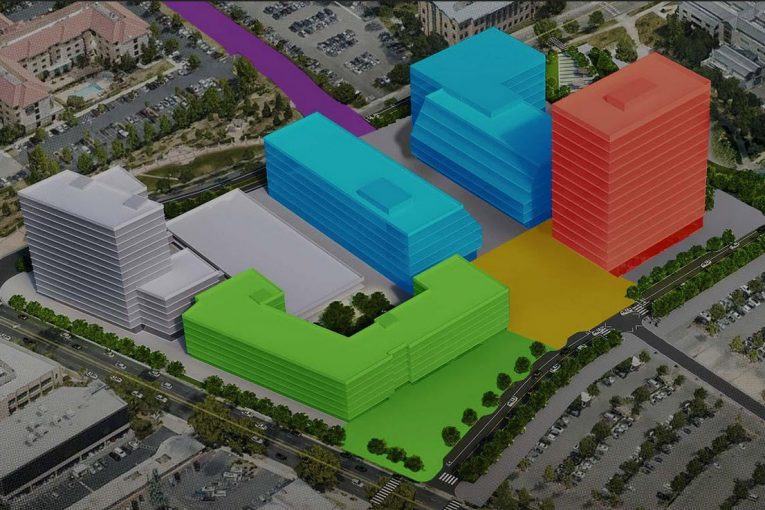

Innovation Hub Expected to Draw National Interest
By News and Media Relations
The University of California, Davis, has issued a request for qualifications, or RFQ, to real estate developers interested in financing, designing, building, owning and managing the first phase of Aggie Square, a new innovation hub for the university’s Sacramento campus.
Aggie Square’s initial plan includes:
- 500,000 square feet of science, technology and engineering space
- 250,000 square feet of classroom, office and coworking space
- 200 multifamily units for university-affiliated individuals
- 40,000 square feet of “community-serving” ground floor space
UC Davis has identified a series of themes that reflect university strengths, community priorities and entrepreneurial opportunities. The university has and will continue to commit significant programming  and resources and recruit partners around these initial programs:
and resources and recruit partners around these initial programs:
- Lifelong learning and workforce development
- Life sciences, technology and engineering
- Food and health
- Public Scholarship and Engagement
- Graduate School of Management Executive MBA Program
- Support for “Sacramento Quarter” for undergraduate students
The diverse and complex nature of the project is likely to require sophisticated teams of developers.
“We imagine that many developers may assemble teams that have individual development expertise in the different building types,” said Bob Segar, Aggie Square planning director. “We are expecting a strong response from local and national applicants.”
The RFQ lists several criteria to help recruit developer teams with the right expertise, capacity and experience to collaborate on the university’s vision. Those criteria include:
- Demonstrated success developing and managing similarly complex, mixed-use projects
- Experience working with institutions of higher education and sophisticated bureaucracies
- The resources and capacity to finance and manage this project
- Experience collaborating with organized labor
- Demonstrated commitment to diversity, equity and inclusion
Developers have until Aug. 9, 2019, to submit their qualifications to UC Davis. The university will review submissions until early September and then invite a short list of developers to submit more detailed proposals for the project. UC Davis intends to have a final developer team selected in December.
Meanwhile, UC Davis will convene meetings with experts in three of the Aggie Square themes — lifelong learning; life sciences, technology and engineering; and food and health — to identify the specific opportunities this unique project can generate.






Interesting that Aggie Square goes to RFQ around the same time as ARC comes out with a proposal. Big day in the Valley for Economic Development.
Craig, Aggie Square has disclosed a considerable amount of information about how they are going to fill the facilities they are planning to build. So far ARC/MRIC has not done so.
The Aggie Square announcement by itself makes this a big day in the Valley for Economic Development. What ARC/MRIC’s contribution is to that big day is a bit elusive at this time.
Here’s a big “diff”… Sacto doesn’t care much about who tenants/owners will be… Davis folk have lots of hand lenses, looking for ‘nits’ to pick to stop any development… big “diff”…
Marc V. Levine–Professor Emeritus of History, Economic Development, and Urban Studies and was the co-founder and long-time director of the Center for Economic Development at the University of Wisconsin-Milwaukee–in a video from 2013: https://www.youtube.com/watch?v=EuTsUF2xPZc
Pay special attention to the end when he breaks down the neoliberal interests who push these types of proposal and (and who have co-opted university presidents in the process–we see the same dynamic playing out here in Davis):
“I’d like to least spend a couple minutes outlining for you… a rent-seeking coalition that is individuals who in economics terms want to establish a regulatory framework or a policy framework in which they can rather than generating true value extract rent from policies.
And there is I think a rent-seeking coalition that makes the university the entrepreneurial University of very powerful of force indeed a certain ideological contagion is like as I call it from research commercialization:
*first of all there are obvious promoters and lobbyists people who make money from this the association of university technology managers people who work in tech transfer offices across universities;
* the association of university research parks: they have a vested interest in saying these are major economic development benefits so tech transfer managers and administrators university administrators increasingly make their careers as economic development managers
* presidents and chancellors: there are now vice chancellors for economic development actually at most universities in the United States
* part of the coalition are clearly entrepreneurial scientists. people saw that Boyer and Coen made millions from Genentech and that scientists can in fact score big big big amounts of money
* regional corporate leadership which pushes the so-called alignment of the entrepreneurial university with a regional economy pushing it not only in terms of research but also in terms of curriculum and the like
* and then a larger group of players that are sort of fairly obvious the biotech and big pharma industry that can get highly subsidized research from the universities patent lawyers who make a lot of those fees that cost tech transfer offices over a million dollars a year
* and politicians who want to claim credit for what they call ‘economic development”
…you have a situation where the evidence is fairly overwhelming that the entrepreneurial University doesn’t promote the benefits that are purported that it does have substantial costs to local communities but there is an unstoppable coalition…”
Gotta’ love cut and paste… from one thread, to another… much easier… effectiveness, not so clear…